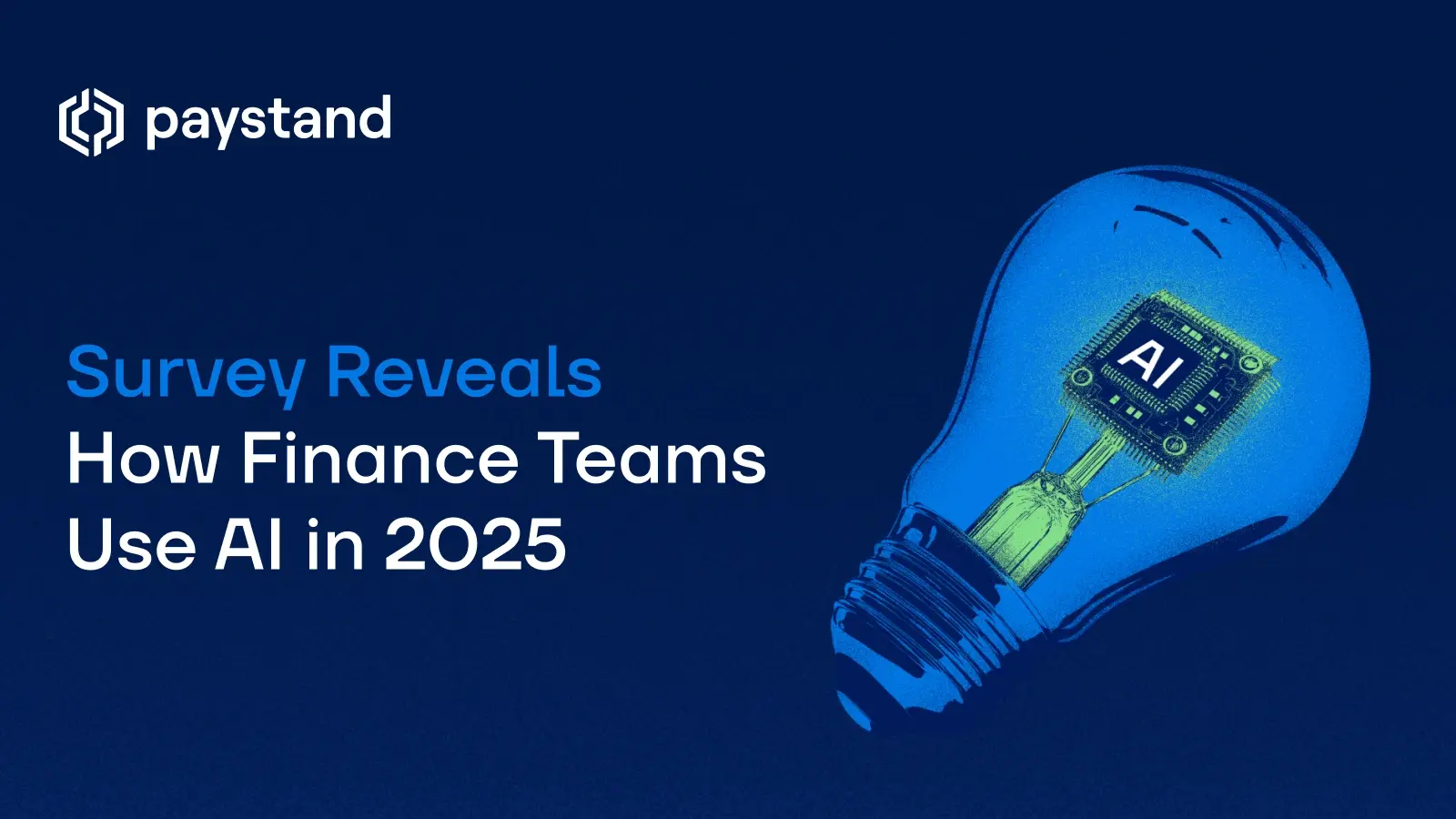Survey Reveals How Finance Teams Use AI in 2025

Table of Contents
- Trends From The Finance Function
- Key Areas Where AI Is Delivering Impact
- What’s Holding Back Adoption?
- Generative AI, NLP & Predictive Tools in Action
- Experts Weigh In: Real Advice for Finance Leaders
- Your Next Steps
Key Takeaways
- Paystand surveyed over 300 finance professionals in 2025 to understand AI trends in finance operations.
- Most teams are still in early stages of adopting artificial intelligence (AI), with just 1% reporting full integration.
- AI is enabling the finance function to shift from transactional work to data-driven strategy.
- Financial Planning & Analysis (FP&A), reporting, and compliance are seen as the most ripe for disruption.
- Generative AI, predictive models, and anomaly detection are reshaping how finance leaders work.
- Concerns about data accuracy, cybersecurity, and over-reliance are slowing full adoption.
In 2025, Paystand surveyed more than 300 finance professionals from diverse industries and company sizes. The findings reveal both cautious optimism and a hunger for innovation across the finance function.
The majority of respondents (65%) reported that they are still in the exploratory phase, researching use cases and experimenting with tools, but not yet rolling out AI at scale. Only 18% are piloting limited AI deployments, while 15% have adopted AI in select workflows. Just 1% reported full AI integration across their operations. This slow uptake suggests that finance is approaching AI adoption pragmatically, with a focus on risk mitigation and compliance.
The data also underscores the unique pressure on finance teams to maintain accuracy, trust, and auditability. Unlike other departments where innovation can proceed quickly, finance must balance innovation with regulation.
Trends From The Finance Function
While the Paystand survey focused on adoption levels and functional priorities, broader industry research has highlighted several consistent trends shaping how finance teams approach AI in 2025.
According to industry-wide data from Industry.com:
- Rising Operational Costs: 52% of finance leaders said increasing cost pressures are driving them to explore automation and AI solutions.
- Manual Work Remains a Burden: 48% cited manual processes and the lack of automation as key pain points in their daily operations.
- Compliance Challenges: 42% highlighted regulatory burdens as a major obstacle to productivity and innovation.
- Underutilized Data: 30% admitted that, despite managing vast amounts of data, they struggle to generate actionable insights.
These findings point to a finance landscape that is overburdened by repetitive tasks and underserved by current tools. AI, particularly AI-powered automation and data analysis tools, offers a potential escape route. The benefits of AI in finance go beyond efficiency gains—they include more strategic use of data, stronger fraud detection capabilities, and smarter decision-making.
Key Areas Where AI Is Delivering Impact
When asked which areas of the finance function AI will disrupt most in the next two years, respondents shared the following:
- Financial Planning & Analysis (44%): The clear front-runner, FP&A is increasingly reliant on AI-driven scenario modeling, predictive models, and data visualization tools.
- Reporting & Consolidation (33%): Generative AI and NLP are helping automate narrative reports, board presentations, and financial summaries.
- Audit & Compliance (19%): AI enables finance teams to track irregularities and ensure audit trails through automated data reviews and anomaly detection.
- Treasury & Capital Planning (4%): While still emerging, AI use in this area includes dynamic cash forecasting and AI-assisted investment modeling.

AI is most effective when it intersects with vast amounts of data and high-frequency decision-making. FP&A and reporting are prime candidates due to their strategic nature and reliance on timely, accurate information.
Beyond workflows, AI is also transforming the traditional finance org chart. Roles like the controller, treasurer, and FP&A analyst are evolving to include skills in data science, automation, and AI oversight. As responsibilities shift, organizations are restructuring teams to align with more strategic, tech-enabled finance functions. These shifts are prompting a rethinking of how teams are structured, with changes in reporting lines and skill requirements that reflect the growing integration of AI.
What’s Holding Back Adoption?
Despite the benefits of AI in finance, barriers remain:
- Data Integrity Risks (38%): Finance professionals are wary of AI hallucinations or inaccuracies, which could lead to flawed decisions.
- Cybersecurity and Privacy (37%): The sensitive nature of financial data makes cybersecurity a top concern.
- Over-Reliance on Automation (9%): Leaders fear that too much automation may erode human oversight.
- Lack of Transparency (4%): Black-box AI systems that lack explainability pose challenges for auditability and stakeholder trust.

These concerns reflect the cautious mindset of finance leaders. They understand the power of AI but demand governance, transparency, and control. It's not just about adopting artificial intelligence—it's about doing it responsibly.
Generative AI, NLP & Predictive Tools in Action
AI's role in finance is no longer theoretical. Across the industry, forward-thinking teams are already applying:
- Generative AI to draft financial narratives, explain variances, and accelerate report creation.
- Natural Language Processing (NLP) to analyze contracts and detect risky language in agreements.
- Predictive Models for M&A readiness, revenue forecasting, and spend analysis.
- Anomaly Detection for fraud detection and anti-money laundering activities.
- AI-Powered Reconciliations that match transactions at scale and reduce human error.
These AI tools are particularly valuable in a world where finance must be fast, flexible, and transparent. AI enables finance teams to move from reactive to proactive—identifying trends before they become issues and spotting potential fraud before it causes damage.
Experts Weigh In: Real Advice for Finance Leaders
During the webinar, AI in Finance: How Finance Leaders Are Using AI Today, two industry veterans, Julianne Averill (Stanford Advisors) and Josh Aharonoff (Mighty Digits), shared firsthand perspectives on AI in finance:
“AI is saving about 82% in operational costs. But the bigger win is moving from backward-looking reporting to forward-looking decision support.” — Julianne Averill
“AI exponentially increases productivity and reduces errors. But knowing how and when to use it is critical.” — Josh Aharonoff
Their advice? Treat AI like a co-pilot. It won’t replace your team, but it will raise the standard for what your team can achieve. Upskilling is essential. Finance professionals must now develop literacy in automation, prompt engineering, and data storytelling.
Your Next Steps
Curious how leading teams are actually implementing AI in the real world? Want to see workflows, tools, and use cases that deliver measurable ROI? Download the full ebook: How Finance Teams Use AI to Drive Better Decisions
Inside the report:
- Detailed survey results and charts
- Practical implementation frameworks
- Success metrics and KPIs to track
- Expert commentary from finance leaders
- Roadmaps for building AI-ready finance teams
Don't get left behind. The finance function is evolving fast, and the benefits of AI are too great to ignore. With the right approach, you can modernize your operations, reduce friction, and become a more strategic partner to your business.








